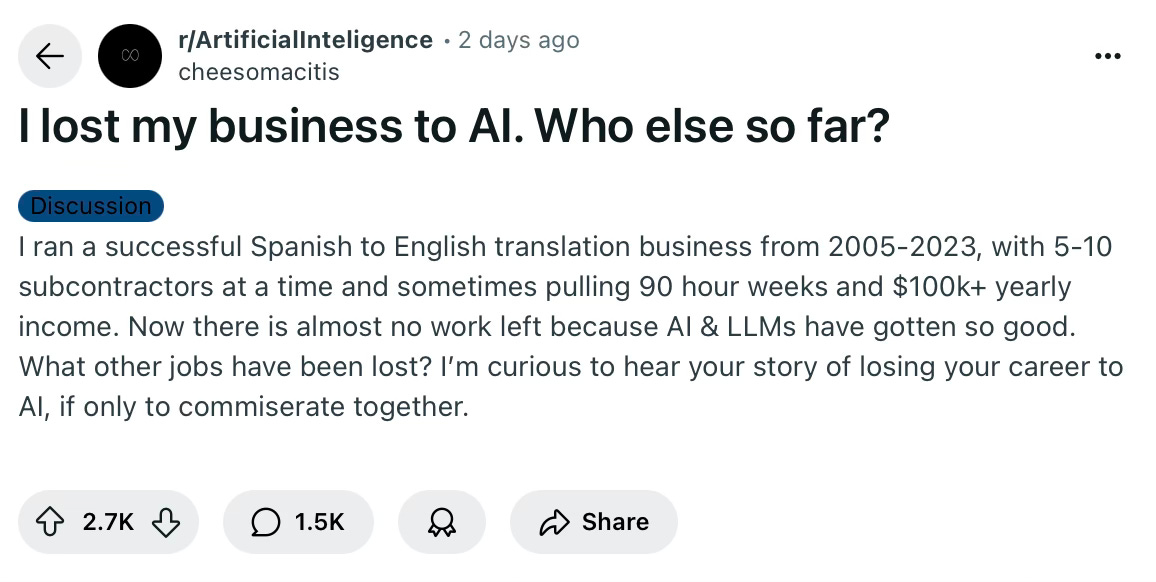The Real Risk of AI Isn’t Replacement. It’s Irrelevance
AI Won’t Take Your Job. It’ll Erase It from the System.
Last Friday evening, instead of watching Black Mirror, I ended up writing a LinkedIn post about one of the most repeated lines in the AI conversation:
"AI won’t take your job. A person using AI will."
It sounds clever. Empowering, even. But it’s not quite right.
Increasingly, jobs aren't being lost to more AI-savvy colleagues. They're disappearing because the system has simply stopped asking for them. Not out of malice or mismanagement, but because the way we create and capture value is shifting. Quietly. Systemically.
The shape of disruption
This isn’t a new pattern.
Telephone operators weren’t replaced by more efficient switchboard operators. The switchboard itself disappeared from mainstream use, and with it, the job.
Paper map designers didn’t lose to faster illustrators. GPS navigation became the default for hundreds of millions of people, turning paper maps into niche tools rather than everyday necessities.
Translators aren’t just losing work to peers using AI more effectively. Many are losing work entirely because large language models are "good enough" for clients' needs. The high-stakes, high-context work may remain, but much of the day-to-day translation is being commoditised.
The disruption isn’t loud. It’s not dramatic. It doesn’t come with a pink slip. It arrives in silence. The emails stop. The projects dry up. The request just never comes.
That post struck a chord. As I write this, it’s been seen by nearly 200,000 people, with over 150 comments, many from translators, creatives, educators, and technologists. Some challenged the idea. Many amplified it with their own stories. One comment stood out:
"The content [created by ChatGPT] was good enough that they walked away weeks later. They no longer needed to prompt the human."
That’s the heart of it. Not competition. Obsolescence by evolution.
Why I’m still optimistic
Still, I’m not pessimistic. As you know, I’m not in the "AI will destroy everything" camp. Yes, disruption is real. The early impact is hitting hardest where work was once repetitive, commodified, or predictable. And yes, power is concentrating around large digital players. But this is not the end of human relevance. Far from it.
If anything, we’re entering a phase where human intentionality becomes the rarest and most valuable resource. AI is good at producing. We need more people who can define what should be produced and why.
We’ll need roles we haven’t had before. People who can manage, steer, and sense-check the work of algorithms. In my book, I call them "algorithm whisperers": people who don’t just prompt systems, but orchestrate them. Who understand how outputs align (or misalign) with business needs, ethics, or customer expectations.
Three ways to stay relevant
1. Move from execution to orchestration. Stop thinking in tasks. Start thinking in systems. Don’t just write reports or code or copy. Learn how to delegate those things to AI and focus on how they fit together to create value. Want an insight into my day? I juggle several LLMs, intuitively knowing which is better at what, and assigning jobs accordingly. It takes practice, but it pays off. I’m faster than I’ve ever been, and the quality of my work has improved because I can focus on refinement—the art, not the labour.
2. Sharpen your judgment. Having said that, the most defensible skill in the AI era is not speed or scale. It’s judgment. The ability to decide what matters, what doesn’t, and what questions to ask next. AI can simulate expertise, but it can’t replicate experienced, situational thinking. If the marginal cost of content is near zero, the real value lies in what you choose to pursue. Working with AI is like sculpting. The tools are powerful. But shaping meaning still requires a human eye.
3. Embrace ambiguity. AI thrives in clean, well-defined domains. But the real world isn’t clean. The more you can navigate fuzzy problems, shifting constraints, and complex human dynamics, the more valuable you become. Not everything can be translated into a prompt (at least for now). And perhaps that’s where we can still thrive.
This isn’t just a time to adapt. It’s a time to invent the roles that AI can’t define for us. Let’s be honest about what we’re losing. But let’s also be bold in exploring what we might gain.
In the next post, I’ll explore some of those emerging roles—the hopeful, human side of this transition. The White Mirror, if you will.
Until then, here’s the question I’ll leave you with:
Are you learning how to use AI? Or are you learning how to stay relevant in a world where some roles are no longer needed?
Because they’re not the same thing.
Stay curious,
Marek
P.S. I didn’t say AI will erase your job. But I didn’t say it won’t either. Predictions are tough, especially about the future. But designing for relevance? That’s always a good strategy.






Recent school #curriculums in Australia have removed emotional elements (I.E. manners), supposing that ‘they wasted time’ & ‘brought in a political/spiritual basis’. A generation has been scared 😱 & what if those implications? (leave it to the next few decades 🤷🏽♀️)
Great article! I’m really interested in your input around education and AI, I wanted to attend the Curriculum Connect Symposium but unfortunately it’s at 2 AM EST :( Hoping you share something similar online soon.